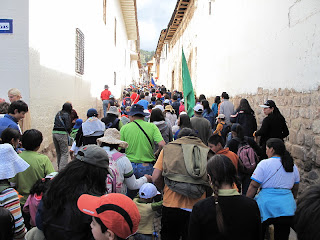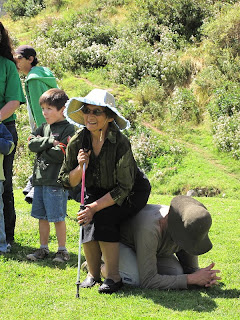The perfect school may be right here in Cusco.
Isabel and Sophia had the great fortune of being admitted to the Peruvian equivalent of a charter school for this academic year. They attend Pukllasunchis ("pook-ya-soon-chees) which means "Here, we play" in Quechua. We had heard of Puklla from a few acquaintances but didn't have the connections to get the girls in when we first arrived. By October we had made a new friend, Amy Bakal, an ex-pat from the upper west side of Manhattan. She has two daughters, both of whom attend/ed Puklla and she arranged for us to have a private audience with the school's principal, Raul. In short, he agreed to let our girls in, knowing they would bring a taste of North American culture to the school and would be leaving after half the year (the school year here begins in March and winds up in December). So, intrepid little souls, they walked into this new place on March 1st not really knowing what to expect.
The physical setting of the school is stunning. Its adobe and live-edge wood buildings are wedged into a tight drainage, sharing the valley floor with a small river running through the grounds. Even though the valley is narrow there is a sense of openness and space to the campus. Isabel returned home one night complaining of a blister on her finger. Instead of making paper maché dolls or the like in art class in the US, both she and Sophia have learned to spin wool with a drop-spindle and Isabel is almost done weaving a belt on a back-strap loom! She also reported this week that she can play "Yesterday" on the guitar thanks to the lessons she is receiving as part of music class. One night at dinner Sophia grabbed the 8 inch chef's knife claiming that she had learned how to cut in cooking class. Yes, that's right, kindergartners take a cooking class. While skeptical at first, it turned out that she was pretty adept at cutting slices of cheese for us at dinner. Boy, was she proud.
Way back at the start of our trip to Peru we became friends with a family from Denmark who were traveling the world in a super-converted 1986 VW bus. They spoke almost no Spanish, but were driving themselves around some of the most remote sections of the Andes in their bus, named Mary. They had three kids, aged 7, 9 and 10, and they were all totally committed to the experience. It turned out that both Dennis and his wife were archers, Dennis missing the 2008 Olympic Qualification round by 2 millimeters. Our American girls were definitely more reserved than their Danish kids who were crossing streets by themselves and climbing up anything steep they could find in the countryside. I sat with Dennis and Birgitte one morning over tea and had an intense conversation about child rearing. Dennis told me about a time when one of his sons had become obsessed with fire and nearly set the house ablaze while experimenting with matches. Instead of scolding him, Dennis marched him into the woods near their house and built a proper bonfire. Once the fire was reduced to ashes he allowed his son to handle the still blazing embers and they burned his hands. He didn't burn his son's hands, he just let him explore and through this experience (and the permission to do it) his obsession with fire waned and eventually disappeared. Both Dennis and Birgitte were big proponents of allowing children to take reasonable risks in order to map out and understand their world. I felt a bit defensive at first, but realized that I had done the same thing for myself once I left the house at the age of 17. My parents were at least as protective with me as I am with my children, and I survived a series of mishaps as I began to make my way in the world as an independent adult. I learned a great deal from each of my mistakes and continue to navigate my world guided, at least in part, by some of these early lessons. The Danes had a point, why wait until children leave the house to allow them to experience a little danger and excitement in their lives?
For precisely this reason, I am so happy that Isabel and Sophia are attending Puklla. There are no English speakers there, so they are speaking, reading, writing and listening to Spanish all day. They are making new friends, trying new foods, and learning how to be independent thinkers and doers. They are also learning how to do "dangerous" things like cutting with a knife and collecting stones from the river bed. They are doing what kids do best: learning from experiences, exploring their world, and playing.
Last weekend was Pukllasunchis' Family Fun Day. The entire school community met at the center of the city and walked, en mass, up to the ruins of Saksaywaman. What began as a walk quickly turned into a deep and beautiful learning experience. Half way up to the ruins we were handed a one page essay to read as we walked. It was called "Grandma's Table." The basic gist was that an old woman's husband dies, leaving her alone and unable to care for herself. Her six children and their families gather to decide what to do. No one wants the burden of caring for her and arguments ensue. Eventually one of the woman's grandchildren sees her and comes running, arms outstretched, to embrace her grandmother. At that moment it is decided, the old woman will live with the family of this grandchild, much to the relief of all her other children. Once moved in, the old woman is sitting at the dinner table and, being old, has difficulty keeping food in her mouth. Her son, disgusted, moves the old woman to a small table in a dark corner of the dining room, explaining that if she can't eat like a human being she will have to eat by herself. A few days later the son walks by his daughter, the same granddaughter that hugged his mother that day. She is busy building something with her blocks and her father asks what she is making. "A little table for you to eat at alone when you get old and we have to take care of you" she replies. The son, suddenly realizing his mistake, runs to the dining room and removes "Grandma's Table," inviting her to eat with the rest of the family from this point forward.
One of the teachers from the school then led our group of 30 people in a dramatic re-enactment of the story on the hillside next to the ruins. I was cast as the "chair" and an actual old woman was cast as the grandmother. She sat on my back as I knelt on the ground, greeting her grieving children as they came to offer their condolences one by one. Then we wrote and performed a song telling the story of "Grandma's Table" and its moral. Sophia took the whole thing in like the sponge that she is and was full of questions and "ah-has."
We then began a series of group initiatives and relay races in the fields above. There was good food, we made new friends, we worked together, we had fun. It was an enormously positive experience and I wondered if something like it could be pulled off in Maine. Yes, probably, I thought.
So look for "Family Fun Day" at a public school near you in the 2010-2011 school year. School isn't just about great experiences for kids, it works best when it's a family affair. I am very grateful for Pukllasunchis, and even more so for the fact that our children get to go there. We will all miss it!
Sunday, May 2, 2010
Subscribe to:
Post Comments (Atom)








No comments:
Post a Comment